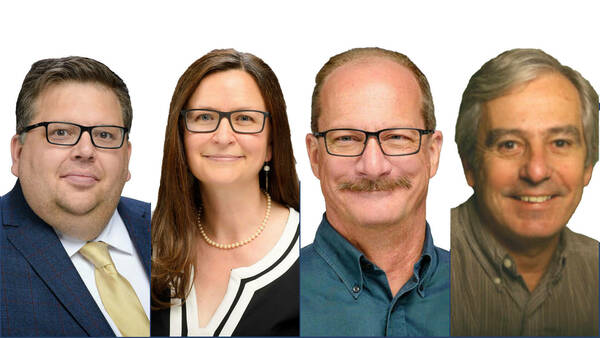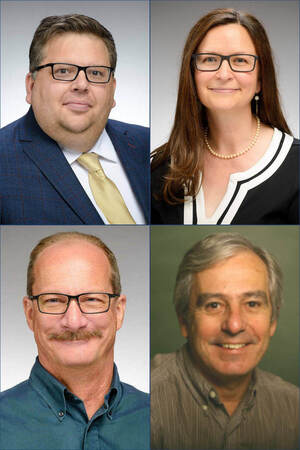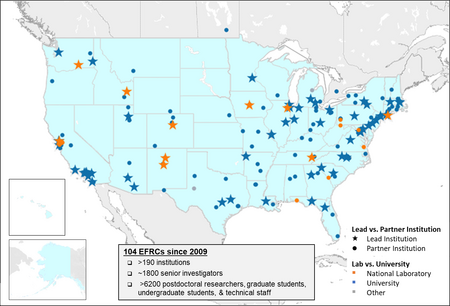
The U.S. Department of Energy (DOE) Energy Frontier Research Centers(EFRCs) is a basic research program funded by the Office of Basic EnergySciences (BES) that brings together creative, multidisciplinary, and multi-institutional teams of scientific researchers to address the toughest grandscientific challenges at the forefront of fundamental energy science research.EFRCs provide the foundation for collaborative efforts targeting discoveryscience and use-inspired basic research to address priority research directionsand opportunities. EFRCs use powerful new tools for characterizing,understanding, modeling, and manipulating matter from atomic to macroscopiclength scales. EFRCs also train the next-generation scientific workforce byattracting talented students and postdoctoral researchers interested in energyscience. (Source: https://science.osti.gov/bes/efrc)

This workshop will address the key aspects of EFRCs described above andanswer some of the most relevant questions in preparation of the next DOE callanticipated by the end of 2023, including the following:
- What does it take to lead an EFRC proposal and award?
- What are the primary objectives and expected outcomes?
- What is the difference in leading an EFRC or being a sub-recipient?
- How can I prepare for the next DOE call?
Current and former EFRC principal investigators (PIs) at Notre Dame will sharetheir experiences in leading and being a sub-recipient partner, while membersof Notre Dame Research and ND Energy will discuss pre-award and post-award support services and answer questions related to large center grantproposals and project management. There will be ample time for participants toask questions throughout and to have further discussions.
All Notre Dame faculty are invited to attend and gain a deeper understanding of EFRCs andthe many resources and services available to them as they contemplate theirown research expertise and how they can become the next successful EFRClead or sub-recipient partner at Notre Dame.
If you have any questions, please contact Ginger Sigmon, Managing Director of ND Energy, at gsigmon@nd.edu.
Workshop Schedule
| 4:00 p.m. | Introductions and Opening Remarks |
| Jeffrey F. Rhoads, Vice President for Research and Professor of Aerospace and Mechanical Engineering | |
| Patricia L. Clark, Associate Vice President for Research and O'Hara Professor of Chemistry and Biochemistry | |
| Faculty Presentations | |
| Peter C. Burns, Henry J. Massman Professor of Civil and Environmental Engineering and EarthSciences, Concurrent Professor of Chemistry and Biochemistry, and Director of ND Energy EFRC Director, Materials Science of Actinides (MSA), (2009-2018) |
|
| Jay A. LaVerne, Professional Specialist, Notre Dame Radiation Laboratory and Physics EFRC key personnel, Interfacial Dynamics in Radioactive Environments and Materials (IDREAM) (PNNL, 2016-) EFRC senior investigator, Molten Salts in Extreme Environments (MSEE) (BNL,2018-) |
|
| Resources and Support Services | |
| Staff in Notre Dame Research and ND Energy | |
| 5:00 p.m. | Reception and Further Discussions |
| Faculty will conduct further discussions with presenters and fellow participants while enjoying light refreshments | |
| To help with planning this portion of the workshop, please register your attendance before August 16 at: https://forms.gle/vQ5RgXdC52nu5Zkq8. |
More About EFRCs

Since its inception in 2009, there have been 104 centers across 41 states, including theDistrict of Columbia. Biennial funding opportunities for 4-year awards started in 2014. The2022 funding opportunity marks the 6th class of these Energy Frontier Research Centersawards, with a targeted competition in clean energy sciences, transformativemanufacturing, microelectronics, polymer upcycling, carbon dioxide reduction, andquantum information science. The 2022 open competition resulted in 16 new four-yearcenters, 17 four-year renewal, and 10 two-year extension awards to existing centers.These centers will join the 8 continuing EFRCs awarded in 2020 that focus onenvironmental management, microelectronics, polymer upcycling, and quantuminformation science to make 51 active Energy Frontier Research Centers, each one with itsown unique mission, to support the Department of Energy’s initiatives in advancing basicenergy research across the United States.
This workshop is sponsored by Notre Dame Research and ND Energy
Originally published at energy.nd.edu.